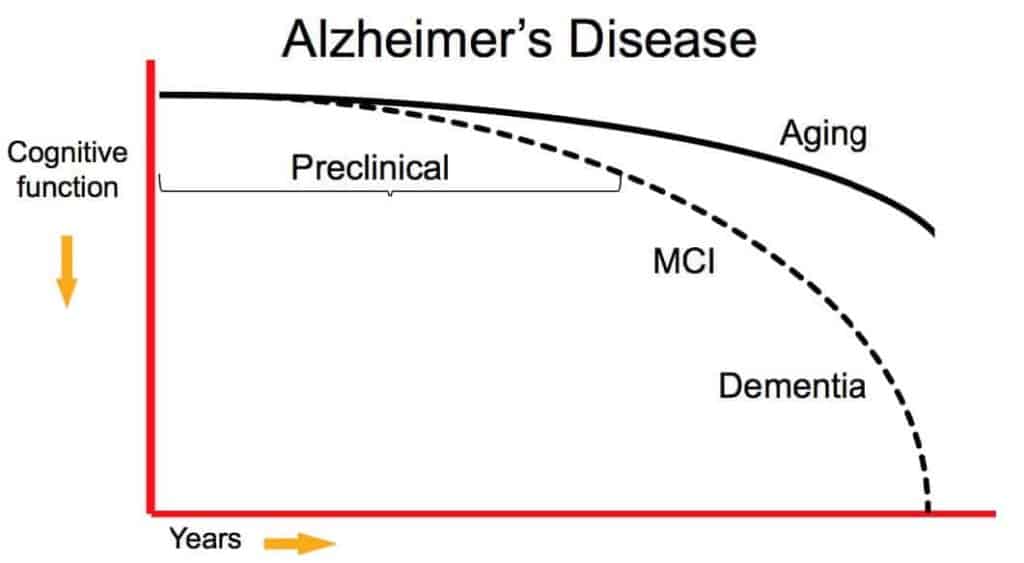
Advances in biomarkers, both traditional and digital, have shifted the way we view Alzheimer’s disease. There is increased recognition that Alzheimer’s disease should be viewed as a multifaceted process that moves along a continuum. Throughout this continuum, the presence and manifestation of Alzheimer’s disease vary depending on the stage of the disease.
In this article, we provide a high-level overview of the stages in the Alzheimer's disease continuum, with a focus on Mild Cognitive Impairment (MCI) due to Alzheimer’s disease.
The Alzheimer's disease continuum consists of five stages:

Alzheimer's disease and the consequent changes in the brain begin long before symptoms arise. Preclinical Alzheimer’s disease is the first phase of the Alzheimer’s disease continuum and is a newly defined stage commonly referred to as the “silent” stage of Alzheimer’s disease because no clinical symptoms are present. In the majority of cases, individuals with preclinical Alzheimer’s disease will not notice any symptoms, nor will their friends and family. The preclinical stage can last years, possibly even decades.
Preclinical Alzheimer's disease begins when the first neuropathologic brain lesions show up in the brain and ends when the first recognizable clinical symptoms begin. The first lesions to appear in the brain are beta-amyloid plaques, a distinct pathology of Alzheimer's. Beta-amyloid proteins begin to collect in the brains of those with Alzheimer's disease as early as 20 years before symptom onset.
Mild Cognitive Impairment causes changes in cognitive function significant enough to be noticed by friends or family, but not significant enough to affect daily functioning. Mild Cognitive Impairment can be caused by a variety of conditions, including neurodegenerative diseases such as Alzheimer’s disease and Parkinson’s disease and other conditions such as depression, thyroid problems, liver or kidney problems, and sleep disorders, among others.
Mild Cognitive Impairment is typically classified based on which cognitive abilities are affected:
The standard criteria for Mild Cognitive Impairment are as follows:
To know with certainty that Mild Cognitive Impairment is caused by or is due to Alzheimer’s disease, Alzheimer’s pathology must also be present in addition to meeting the above criteria.
Mild Cognitive Impairment due to Alzheimer’s disease, often referred to as the prodromal stage of Alzheimer’s disease, is the second stage in the continuum. Individuals with Mild Cognitive Impairment due to Alzheimer’s disease have minor changes to their memory, thinking, and other cognitive abilities. This decline in cognitive abilities is typically not severe enough to interfere with patients’ Activities of Daily Living (ADLs) or daily functioning, meaning the changes are not significant enough to affect work, family, or personal relationships.
Symptoms of Mild Cognitive Impairment due to Alzheimer’s disease include:
Individuals with mild dementia due to Alzheimer’s may still be able to live and complete ADLs independently, but have experience symptoms such as:
Typically, there are similar symptoms in this stage to the previous stage, but the symptoms become more pronounced. In addition to cognitive changes, they may also experience function changes, such as issues with fine motor coordination and changes in gait. Individuals with moderate dementia due to Alzheimer’s disease may have difficulty completing normal ADLs, such as eating, bathing, and dressing, and may require assisted living.
Individuals with severe dementia due to Alzheimer’s disease will require assistance with most normal activities. In this stage, symptoms typically include:
Altoida’s mission is to accelerate and improve drug development, neurological disease research, and patient care. To learn more about our precision-neurology platform and app-based medical device, contact us!